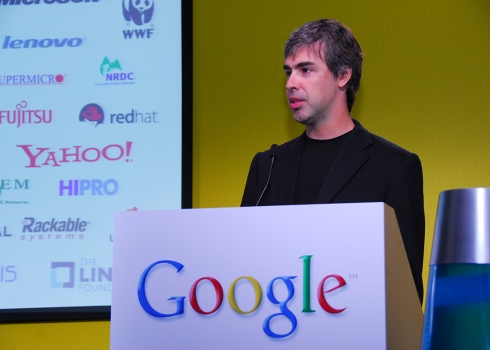With news of Google co-founder Larry Page set to become the company’s new CEO this April, should Americans be bracing themselves for an abrupt about-face on net neutrality at Google as the more ideological and product-focused Page takes the reins?
Don’t hold your breath, according to industry experts. It’s unlikely that Page will make any huge policy changes.
“One can hope that Page’s view is sympathetic to net neutrality, given his enthusiastic support of open broadcast white spaces — his words– ‘wifi on steroids'”, writes Jeff Jarvis, the author of What Would Google Do, in an e-mail to TPM. Jarvis did add that Page’s opinion may not even matter — given Verizon’s recent legal challenge to FCC regulations, net neutrality is already in the hands of the courts.
Even open internet advocates don’t see Google’s stance on the issue changing with its management. “I think they got chastened a little bit with their little deal with Verizon on the public policy side,” Art Brodsky, communications director of the DC-based advocacy group Public Knowledge, told me, “but I can’t see them making any really bold moves at this time. I hope I’m wrong, but now it will be all up to the courts.”
Some speculate that net neutrality might not even be one of Page’s personal priorities. “He’s interested in tons of things: alternative energies, self-driving cars, you name it,” says industry analyst Scott Cleland, the president of the research firm Precursor and publisher of a Google-watching website. Cleland told me that one of the biggest challenges Page is going to have is trying to bring focus to an unfocused company. “Google has an enormous amount of tough, pressing decisions to make: which markets to focus on; which markets to less-than-focus on; which intellectual property fight to fight and which to settle. There probably isn’t a company on the planet that has more serious external fights going than Google.”
News of the unexpected shift in management came last Thursday with CEO Eric Schmidt tweeting that “day-to-day adult supervision is no long needed” for Page. Schmidt came on board as CEO in 2001 as a highly-experienced Silicon Valley executive expected to guide Google and its young founders as it was becoming one of the most powerful companies in the world. While his departure as CEO appears amicable, some speculate that Schmidt was fired following major disagreements with co-founders Sergey Brin and Larry Page when they decided to pull out of China last year.
If it’s policy disagreements that ousted Schmidt as CEO, then it’s not completely out of the question that there could be changes in the company’s position on net neutrality. While Page assumes leadership, it’s really Brin, not Schmidt, who is known as Google’s “conscience”; he’s the one in 2006 who traveled to DC, urging Congress to support net neutrality.
Clearly, much has changed since then: Google later struck a deal with Verizon to allow Verizon to offer faster connections to websites that were willing to pay Internet service providers for faster delivery. And with Brin appearing to take on a smaller role, explaining he plans to work more on his “personal passions,” that could leave Page with more room to maneuver around the Brin’s “don’t be evil” mandate.
But, any major policy reversals seem unlikely given Schmidt’s new role as Executive Chairman, in which he plans to focus “externally, on the deals, partnerships, customers and broader business relationships, government outreach and technology thought leadership that are increasingly important given Google’s global reach; and internally as an advisor to Larry and Sergey.”






